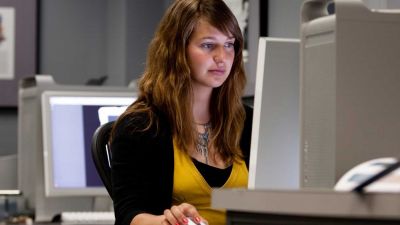
B.A. B.S. Mathematics
Studying mathematics at Concordia University, Nebraska can help you develop basic skills such as arguing logically and rigorously, thinking abstractly, formulating and solving problems, analyzing data and creating and analyzing mathematical models. As a math major, you will find yourself in demand by employers for careers in a wide spectrum of fields.
A bachelor’s degree in mathematics from Concordia University, Nebraska will provide you with a foundation in the mathematical sciences for teaching, graduate school or finding a career. Most students double major in math and:
- education
- business
- computer science
- data science
- physics
- accounting
- chemistry
or another related field to help them prepare for their future vocations.
There are also an endless number of career options outside the math field that you may not have considered, like
- marketing
- health care
- film animation
- sports management
- game development
Explore God’s creation through mathematical expression and learn how mathematics can inform our everyday life and faith.
Program Highlights
WHY STUDY MATHEMATICS AT CONCORDIA?
The mathematics program at Concordia University, Nebraska provides an environment where students can learn mathematics in application. Moreover, the program helps develop students as mathematical thinkers, enabling them to become life-long learners, to continue to grow in their chosen professions and to function as productive citizens.
MEET OUR EXPERT FACULTY
As experts in mathematics, our faculty and instructors bring years of experience to the classroom.
Meet our students
“As a freshman I wasn’t 100 percent sure what I wanted to go into, but I knew being in the math program could help me in pretty much any career field. I’ve been involved with a few engineering internships and plan on applying to law school after graduation, so math was a smart choice.”
Lucas Zoller
Lenexa, Kansas
Accreditation
Concordia University, Nebraska is accredited by the Higher Learning Commission, a regional accreditation agency recognized by the U.S. Department of Education.
Degree Goals
A mathematics graduate from Concordia University, Nebraska will be able to:
- Formulate complete, concise and correct mathematical proofs
- Frame problems using multiple mathematical and statistical representations of relevant structures and relationships and solve using standard techniques
- Create quantitative models to solve real-world problems in appropriate contexts
- Clearly communicate quantitative ideas both orally and in writing to a range of audiences
- Effectively use professional-level technology tools to support the study of mathematics and statistics
Computer Science and Mathematics Minors
- Computer Science
- Cybersecurity
- Mathematics
Career Outcomes
Mathematician
- Use high-level mathematics and technology to develop new mathematical principles.
- Understand relationships between existing principles and solve real-world problems.
- Create models to help resolve practical problems in fields such as business, government, engineering and the sciences.
- Develop computational methods and computer codes to solve math problems.
Statistician
- Apply your mathematical and statistical knowledge to the design of surveys and experiments, analysis of data and interpretation of survey results.
- Create opinion polls, scales and measuring devices.
High School Math Teacher
- Create lesson plans to instruct your students in general or specialized subject mathematics.
- Prepare assignments, homework and tests.
- Assess students’ progress and abilities.
- Keep up with changes in state guidelines and objectives for math learning to help students meet the established criteria.
FAQs
Why is studying math at a Lutheran Christian university unique?
The Lutheran educational tradition is one of rigorous academics, critical thinking and finding patterns and connections help solve problems in the real world. At Concordia University, Nebraska, you can learn to reason effectively, communicate clearly and gain mathematics skills by actively doing mathematics. You’ll grow in your faith as you discover ways in which math and Christian faith inform and enrich each other.
What opportunities are available at Concordia Nebraska for math majors?
There are many opportunities at Concordia University, Nebraska, both on- and off-campus, for those who want to study math. The Math Department at Concordia finds ways to encourage and engage students in their love for mathematics, whether they are majoring in math or not. Classes build geometric Christmas ornaments, take notes on Easter eggs and participate in Hawaiian shirt Friday. Faculty also join students in building labyrinths and playing chess to hone their math skills.
What can you do with a bachelor’s degree in math?
Math is involved in just about every job in some way, but is particularly essential in the fields of science, technology and engineering. If you have a solid background in math, however, you can find a career in just about any field. Some options may include:
- mathematician
- math teacher
- statistician
- cryptography or code breaking
- market research
- fraud investigation
- software testing
Related Programs

Computer Science
Concordia University, Nebraska’s computer science program is designed to help you meet current and future challenges in technology- and application-related fields. Here, you can gain a strong fundamental foundation with an emphasis on practical functions of theoretical concepts.

Physics
Whether you want to explore the mysteries of antimatter, aid in the development of laser technologies or discover new energy sources, Concordia University, Nebraska’s physics program prepares you to pursue careers and graduate degrees in a variety of disciplines, from astronomy to engineering to computer science. You will gain a scientific foundation through a variety of interactive labs, lectures and classwork to make you a professional in the field of physics.

Secondary Education
With a degree in secondary education from Concordia University, Nebraska, you will be equipped to teach grades 7-12, encouraging intellectual and emotional growth at a critical time in the lives of your students. You’ll engage in rich coursework, collaborate with faculty and gain invaluable experience first shadowing a professional teacher and then teaching in your own high school classroom.
Apply Request Info Information Sessions
1 Recent graduates attending graduate school or employed within six months of graduation.
2Average Class Size for Representative Subject Most Aligned with Major, Over Last 5 Years.